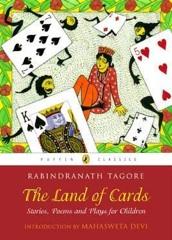

Rabindranath Tagore – A litterateur, poet, artist, musician, educationist, visionary. A man who professed many ‘trades’ and yet excelled in them all.
The Land of Cards is a beautifully complied anthology of Tagore’s poems, plays and stories translated from the original by Radha Chakravarty. Each one is distinctly different from the other. Tagore had a deep understanding of human emotions. He not only had mastery over the pen but also had the uncanny ability to go into the mind of a child and write stories from their perspective.
In the poem Hero he expresses the hidden desire of a young boy to show off his bravery to impress his mother whilst in The Post Office the protagonist is a sickly boy who is forbidden to go out of the house by the overzealous kobiraj (a physician steeped in the traditional methods of healing). The boy makes friends of everyone who happen to pass by his window, and succeeds in giving each one of them a sense of their own worth and of their work.
Kabuliwala, is one of his best known stories for kids, thanks to it being adapted into a film. It is a touching story of an unusual bond between a little girl and the Kabuliwala – a dry fruit vendor from Kabul.
In The Land of Cards, the cards who have been living a strict regimented life, taste freedom and liberation thanks to the visit of a wandering prince. In this story as well as in a few others, one senses Tagore’s impatience with meaningless rituals and blind beliefs. In her introduction,
Mahasweta Devi reminiscences about her days in Shantineketan, when Tagore took their Bengali class. She mentions the story that he had taught, 'Bolai', and how deeply touched she was by the strong ecological message in it. In her words, "we were taught to care for nature, not to break a single leaf or flower from a tree. Today, when the planet Earth is endangered, Tagore's teachings are doubly relevant."
All in all, the book is a delightful medley of vignettes of soaring imagination, soul searching, understated humour and poignant emotions.
Stories that will stay with one, long after the book has been put down.